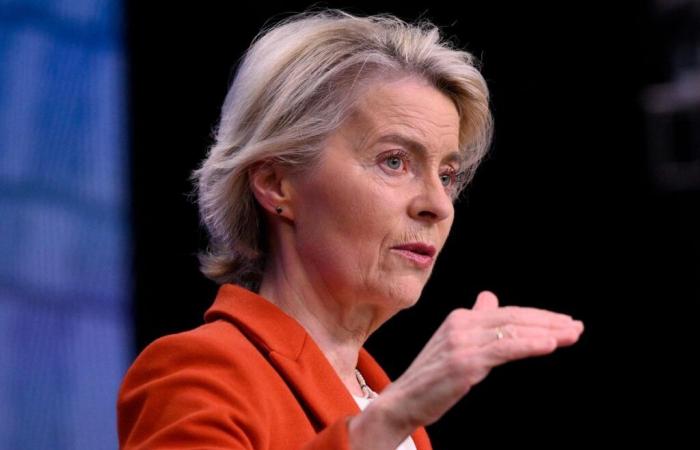– The 27 in favor of a new law to “accelerate” returns
The countries of the European Union called on Thursday “urgently” for a law to speed up the expulsions of illegal migrants.
Ursula von der Leyen in Brussels on October 17, 2024.
AFP
Subscribe now and enjoy the audio playback feature.
BotTalk
Gathered at a European summit in Brussels, the 27 raised their voice on Thursday against irregular immigration, calling “urgently” for a law to accelerate expulsions, following discussions which also highlighted strong disagreements within of the block.
“The European Council calls for decisive action, at all levels, to facilitate, increase and accelerate returns from the European Union,” member states say in the summit conclusions. They invite the European Commission to quickly submit “a new legislative proposal”.
The President of the Commission, Ursula von der Leyen, took the lead on Monday, proposing a new law within a timetable which remains to be determined.
“To the right”
A similar initiative failed in 2018, but “six years later, the debate has evolved”, “towards the right” of the political spectrum, notes a European official. Previously, the 27 debated at length “return hubs”, a flammable proposal for the transfer of migrants to reception centers in third countries.
The Italy of Giorgia Meloni, head of government and of the far-right party Fratelli d’Italia, has reached a controversial agreement with Albania, where the first migrants arrested in Italian waters are starting to arrive.
Several European officials have distanced themselves. These centers are only a “drop in the bucket” and “not a solution” for “big countries” like Germany, said Chancellor Olaf Scholz. The “hubs” have “never shown in the past” that they were “very effective and it has always been very expensive,” criticized Belgian Prime Minister Alexander De Croo.
The Italians on the offensive
Spain is opposed to these outsourced centers, while France, cautiously, calls for “favoring returns when conditions permit”, rather than “in hubs in third countries”, according to the Élysée. “Some are for it, others are against it. It’s a general discussion without a decision, a European diplomat testified at the start of the evening.
On the offensive, the Italians organized an informal meeting around Giorgia Meloni on Thursday morning to promote these “innovative solutions” against irregular immigration.
Around ten countries were around the table including the Netherlands, Greece, Austria, Poland and Hungary of nationalist Viktor Orban, where the next European summit will be held in Budapest on November 8. Ursula von der Leyen also attended.
The Pole Donald Tusk insisted on the migratory pressure suffered by his country. Poland accuses Russia and Belarus of organizing an influx of migrants in a “hybrid” attack intended to destabilize the European Union in the midst of the war in Ukraine.
Far right on the rise
Going against the general tone, the Spaniard Pedro Sanchez called for highlighting the benefits of legal immigration, particularly for work.
In May, the European Union adopted the migration and asylum pact, supposed to come into force in mid-2026, with a tightening of “filtering” at borders and a solidarity mechanism between the 27 in the care of asylum seekers. . Countries like Germany and France are pleading to accelerate its implementation.
And migration issues are coming back to shake up the agenda, pushed in particular by far-right parties, on the rise in many European countries.
Some in the EU “hear what we have been saying for years”, rejoiced the leader of the French far right Marine Le Pen, passing through Brussels for a meeting of Patriots for Europe, the third force policy of the European Parliament after the June elections.
The “Franco-German engine pushes us to act”
Several governments have raised their voices and are calling for the rules on expulsion to be simplified. The “Franco-German engine pushes us to act”, according to a European diplomat.
This toughening of the tone comes as the number of illegal crossings detected at the borders of the European Union fell by 42% over the first nine months of 2024 compared to the same period of the previous year, according to the European Surveillance Agency Frontex borders.
This summit was held in a transition phase in Brussels, where the new team of the European Commission is expected to take office at the beginning of December. It is marked by the difficulties of several European leaders in their countries, particularly Emmanuel Macron, weakened by the explosion of deficits in France and the fragile connection with the new Prime Minister Michel Barnier, from the right and without a majority in the National Assembly.
“Latest news”
Want to stay on top of the news? “24 Heures” offers you two appointments per day, directly in your email box. So you don’t miss anything that’s happening in your Canton, in Switzerland or around the world.
Other newsletters
Log in
AFP
Did you find an error? Please report it to us.
0 comments






